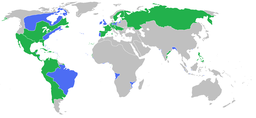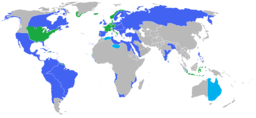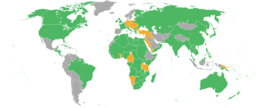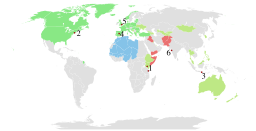World war
| Part of a series on |
| War |
|---|
A world war is “a war engaged in by all or most of the principal nations of the world”.[1] While a variety of global conflicts have been subjectively deemed “world wars”, such as the Cold War and the War on Terror, the term is widely and usually accepted only as it is retrospectively applied to two major international conflicts that occurred during the 20th century: World War I (1914–18) and World War II (1939–45).
Origin of the term
The Oxford English Dictionary cited the first known usage in the English language to a Scottish newspaper, The People’s Journal, in 1848: “A war among the great powers is now necessarily a world-war.” The term “world war” is used by Karl Marx and his associate, Friedrich Engels,[2] in a series of articles published around 1850 called The Class Struggles in France. Rasmus B. Anderson in 1889 described an episode in Teutonic mythology as a “world war” (Swedish: världskrig), justifying this description by a line in an Old Norse epic poem, “Völuspá: folcvig fyrst i heimi” (“The first great war in the world”.)[3] German writer August Wilhelm Otto Niemann had used the term “world war” in the title of his anti-British novel, Der Weltkrieg: Deutsche Träume (The World War: German Dreams) in 1904, published in English as The Coming Conquest of England.
In English, the term “First World War” had been used by Charles à Court Repington, as a title for his memoirs (published in 1920); he had noted his discussion on the matter with a Major Johnstone of Harvard University in his diary entry of September 10, 1918.[4]
The term “World War I” was coined by Time magazine on page 28b of its June 12, 1939 issue. In the same article, on page 32, the term “World War II” was first used speculatively to describe the upcoming war. The first use for the actual war came in its issue of September 11, 1939.[5] One week earlier, on September 4, the day after France and the United Kingdom declared war on Germany, the Danish newspaper Kristeligt Dagblad used the term on its front page, saying “The Second World War broke out yesterday at 11 a.m.”[6]
Speculative fiction authors had been noting the concept of a Second World War in 1919 and 1920, when Milo Hastings wrote his dystopian novel, City of Endless Night.
Other languages have also adopted the “world war” terminology, for example; in French: “world war” is translated as guerre mondiale, in German: Weltkrieg (which, prior to the war, had been used in the more abstract meaning of a global conflict), in Italian: guerra mondiale, in Spanish and Portuguese: guerra mundial, in Danish and Norwegian: verdenskrig, and in Russian: мировая война (mirovaya voyna.)
First World War
World War I occurred from 1914 to 1919. In terms of human technological history, the scale of World War I was enabled by the technological advances of the second industrial revolution and the resulting globalization that allowed global power projection and mass production of military hardware. It had been recognized that the complex system of opposing military alliances (the German and Austro-Hungarian Empires against the British, Russian, and French Empires) was likely to lead to a worldwide conflict if a war broke out. Due to this fact, a very minute conflict between two countries had the potential to set off a domino effect of alliances, triggering a world war. The fact that the powers involved had large overseas empires virtually guaranteed that such a war would be worldwide, as the colonies’ resources would be a crucial strategic factor. The same strategic considerations also ensured that the combatants would strike at each other’s colonies, thus spreading the wars far more widely than those of pre-Columbian times.
War crimes were perpetrated in World War I. Chemical weapons were used in the First World War despite the Hague Conventions of 1899 and 1907 having outlawed the use of such weapons in warfare. The Ottoman Empire was responsible for the Armenian genocide—the murder of more than 1,000,000 Armenians during the First World War—and the other late Ottoman genocides.
Second World War
The Second World War occurred from 1939 to 1945 and is the only conflict in which nuclear weapons have been used. Hiroshima and Nagasaki, in Japan, were devastated by atomic bombs dropped by the United States. Nazi Germany, led by Adolf Hitler, was responsible for genocides, most notably the Holocaust, the killing of 6,000,000 Jews and 11,000,000 others persecuted by the Nazis. The United States, the Soviet Union, and Canada deported and interned minority groups within their own borders, and largely because of the conflict, many ethnic Germans were later expelled from Eastern Europe. Japan was responsible for attacking neutral nations without a declaration of war, such as the bombing of Pearl Harbor. It is also known for its brutal treatment and killing of Allied prisoners of war and the inhabitants of Asia. It also used Asians as forced laborers and was responsible for the Nanking massacre where 250,000 civilians in the city were brutally murdered by Japanese troops. Non-combatants suffered at least as badly as or worse than combatants, and the distinction between combatants and non-combatants was often blurred by belligerents of total war in both conflicts.[7]
The outcome of World War II had a profound effect on the course of world history. The old European empires either collapsed or were dismantled as a direct result of the wars’ crushing costs and, in some cases, their fall was due to the defeat of imperial powers. The United States became firmly established as the dominant global superpower, along with its ideological foe, the Soviet Union, in close competition. The two superpowers exerted political influence over most of the world’s nation-states for decades after the end of the Second World War. The modern international security, economic, and diplomatic system was created in the aftermath of the wars.[8]
Institutions such as the United Nations were established to collectivize international affairs, with the explicit goal of preventing another outbreak of general war. The wars had also greatly changed the course of daily life. Technologies developed during wartime had a profound effect on peacetime life as well, such as by advances in jet aircraft, penicillin, nuclear energy, and electronic computers.[9]
Third World War
Since the atomic bombings of Hiroshima and Nagasaki during the Second World War, there has been a widespread and prolonged fear of a potential Third World War between nuclear-armed powers. The Third World War is generally considered a successor to the Second World War[10] and is often suggested to become a nuclear war at some point during the course of said Third World War, devastating in nature and likely much more violent than both the First and Second World Wars; in 1947, Albert Einstein commented that “I know not with what weapons World War III will be fought, but World War IV will be fought with sticks and stones.”[11][12] It has been anticipated and planned for by military and civil authorities and has been explored in fiction in many countries. Concepts have ranged from purely-conventional scenarios, to limited use of nuclear weapons, to the complete destruction of the planet’s surface.
Other global conflicts
Various former government officials, politicians, authors, and military leaders (including James Woolsey,[13] Alexandre de Marenches,[14] Eliot Cohen,[15] and Subcomandante Marcos[16]) have attempted to apply the labels of the “Third World War” and “Fourth World War” to various past and present global wars since the closing of the Second World War, for example, the Cold War and the War on Terror, respectively. Among these are former American, French, and Mexican government officials, military leaders, politicians, and authors. Despite their efforts, none of these wars are commonly deemed world wars.
Wars described by some historians as “World War Zero” include the Seven Years’ War[17] and the onset of the Late Bronze Age collapse.[18]
The Second Congo War (1998–2003) involved nine nations and led to ongoing low-intensity warfare despite an official peace and the first democratic elections in 2006. It has often been referred to as “Africa’s World War”.[19] During the early-21st century the Syrian Civil War and the Iraqi Civil War and their worldwide spillovers are sometimes described as proxy wars waged between the United States and Russia,[20][21][22][23] which led some commentators to characterize the situation as a “proto-world war” with nearly a dozen countries embroiled in two overlapping conflicts.[24]
Wars with higher death tolls than the First World War
The two world wars of the 20th century had caused unprecedented casualties and destruction across the theaters of conflict.[25] There have been several wars that occurred with as many or more deaths than in the First World War (16,563,868–40,000,000), including:
| Event | Lowest estimate |
Highest estimate |
Location | From | To | Duration (years) |
|---|---|---|---|---|---|---|
| Three Kingdoms | 36,000,000[26] | 40,000,000[27] | China | 184 | 280 | 96 |
| An Lushan Rebellion | 13,000,000[28] | 36,000,000[29] | China | 755 | 763 | 9 |
| Mongol conquests | 30,000,000[30] | 40,000,000[28] | Eurasia | 1206 | 1324 | 118 |
| Conquests of Timur | 15,000,000[31] | 20,000,000[31] | Asia | 1369 | 1405 | 37 |
| Qing dynasty conquest of the Ming dynasty | 25,000,000[32] | 25,000,000 | China | 1616 | 1662 | 47 |
| Taiping Rebellion | 20,000,000[33] | 100,000,000[34][35][36] | China | 1851 | 1864 | 14 |
| World War II | 40,000,000[37] | 85,000,000[38] | Global | 1939 | 1945 | 6 |
| Cold War | 22,345,162 | +94,000,000 | Global | 1947 | 1991 | 44 |
Wars spanning multiple continents[edit]
There have been numerous wars spanning two or more continents throughout history, including:








